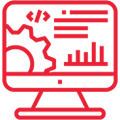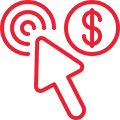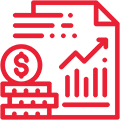“Their communication was excellent and they really did a solid job when it comes to project management. Their team was genuinely interested in working with us and working through our channel and figuring out what we needed. Trust and communication were what set them apart.”
PPC Management Services
High-Impact PPC Management for Complex Sales Funnels
Complex sales funnels require more than simple ad campaigns to drive results. Longer decision cycles, multiple touchpoints, and competitive markets demand a strategic, data-driven approach to PPC.
Our PPC experts design and manage campaigns that attract the right audience, nurture leads across channels, and deliver measurable ROI. With continuous optimization and performance tracking, we ensure your ad spend works harder at every stage of the funnel.
Our PPC Management Process
Market and Competitor Analysis
We start with a thorough analysis of your industry, competitors, and target audience to identify high-performing keywords, audience segments, and bidding opportunities. This ensures your PPC campaigns launch with maximum precision and ROI potential. Our research also highlights gaps competitors miss, giving you a strategic edge.
Result-Driven Campaign Strategies
Every PPC strategy is built around your business goals, whether it’s lead generation, sales growth, or brand visibility. We structure campaigns across Google Ads, Bing, and social platforms to deliver measurable results aligned with your objectives. Each strategy is regularly reviewed to stay in sync with evolving market conditions.
Campaign Execution and Optimization
Our team handles everything from ad creation and campaign setup to bid adjustments and performance monitoring. Real-time data analysis and continuous A/B testing keep campaigns cost-efficient and competitive. We refine targeting, creatives, and bidding rules to ensure ongoing performance gains.
Reporting and Insights
We deliver clear, data-driven reports covering impressions, clicks, conversions, and cost per acquisition. Actionable insights help you understand performance trends and guide smarter advertising investments over time. Reports also uncover growth opportunities for future campaigns.
Case Studies
What’s Included in Our PPC Management Services
PPC Audits and Market Analysis
We begin with a detailed PPC audit to review your current campaigns, keyword targeting, ad performance, and bidding strategy. Our analysis uncovers wasted spend, missed opportunities, and competitor insights to build a clear path toward better ROI. Our initial step ensures campaigns launch with the strongest possible foundation.
Ad Creation and Optimization
Our team crafts compelling ad copy and visuals designed to attract clicks and drive conversions. We continuously A/B test creatives, headlines, and calls-to-action to refine performance and boost engagement across all campaigns. Each ad variation is analyzed to identify the highest-performing combinations.
Optimization and Scaling
As PPC success depends on continuous improvement NEWMEDIA.COM monitor performance metrics, refine keywords and targeting, and scale winning campaigns to deliver long-term growth and measurable ROI. Regular account reviews uncover fresh opportunities for further cost savings and conversions.
Campaign Strategy and Channel Planning
We design a tailored PPC strategy that aligns with your business goals and target audience. From Google Ads and Bing to paid social and remarketing campaigns, we ensure every channel works together to maximize qualified traffic and conversions. We improve our strategy continuously as new data and trends emerge.
Cross-Channel Advertising and Execution
We manage PPC campaigns across search, display, video, and social platforms, using data-driven targeting to reach the right audience at the right time. Real-time bid adjustments and audience segmentation help lower costs while improving results. Advanced audience insights allow for even more precise targeting.
Performance Tracking and Reporting
Our reports provide complete visibility into clicks, conversions, cost per lead, and overall ROI. Actionable insights guide better budget allocation and help identify opportunities for future campaign success. Clear, concise reporting keeps all stakeholders aligned and informed.
See Our Portfolio
Molly Hall Dorais
Colorado Rocky Mountain School
Boost ROI with expert PPC management. Request a proposal for a full campaign plan and clear pricing today!
Request a proposalWhy Businesses Choose Our PPC Management Services
Companies trust our PPC management services to help them reach the right audience, maximize ad performance, and achieve measurable ROI. We handle everything from keyword research and ad creation to campaign optimization and cross-channel advertising, ensuring every campaign aligns with business goals.
Clients stay because our PPC approach delivers consistent results, transparent reporting, and long-term growth in traffic, conversions, and revenue. With our team managing the entire PPC strategy, businesses can focus on serving customers while we ensure campaigns drive real, measurable impact.
What Customers Say About Us
Randall T.
Ready to maximize your ad performance? Connect with our team for a custom PPC strategy and clear pricing.
Book a free consultationRelated Services
Your search for expert PPC management ends here. Maximize your ROI with proven ad strategies and precision targeting.
Receive a proposal










